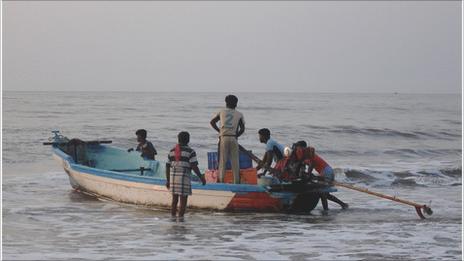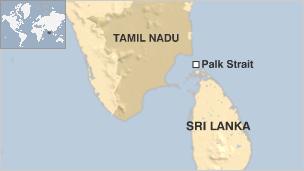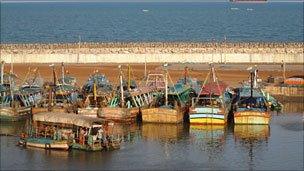Conflict brews between Sri Lankan and Indian fishermen
- Published

While Sri Lanka was in the throes of civil war, Indian fishermen enjoyed uninterrupted fishing rights in the Palk Strait as fishing was banned in northern Sri Lanka. Now Sri Lankan fishermen are back at work only to find their livelihoods threatened by their neighbours across the sea.
Conflict is brewing in the Indian Ocean.
Last month the Sri Lankan authorities held 136 Indian fishermen for fishing in their waters. They were only released after a flurry of diplomatic meetings between the two sides.
In January, villagers in southern India accused the Sri Lankan navy of killing two Indian fishermen at sea.
Fishermen in northern Sri Lanka have raised vociferous objections about Indian trawlers entering their waters.
But in the southern Indian state of Tamil Nadu fishermen also fear for their livelihoods after the latest interventions by the Sri Lankan authorities.
Fishing at will
"We do not find any fish on the Indian side of the Palk Strait, so we are forced to cross the sea boundary into Sri Lanka for a decent catch. But now this is not safe for us," says R Kumaravelu from the fishing village of Nagapattinam.

Traditionally, relations between both fishing communities have been congenial.
Indian fishermen even provided provided shelter and employment to their Sri Lankan Tamil counterparts during the war in Sri Lanka.
And for many of those years Indian fishermen also fished at will in the Palk Strait. Moreover, under the terms of an accord between the two nations in October 2008, Indian fishermen with a valid licence were allowed to fish in Sri Lankan waters.
Now Sri Lanka appears eager to rework the October 2008 agreement with a view to protect the interests of its fishermen in the north of the country.
"The Indian fishermen are poaching en masse, and very close to our coast. This is a problem, as they are coming to our territory and taking our fish away," says Vadivel Krishnamurthy, Sri Lanka's deputy high commissioner to India.
The main bone of contention is the wanton use of mechanised deep-sea trawlers by the Indian fishermen.
According to the Sri Lankan navy, more than 6,500 trawlers have been spotted near the Sri Lankan coast in the past two months.
"These trawlers employ large nets that sweep the ocean floor, trapping not only non-target organisms, but also a lot of young fish too. This affects the breeding cycle, and has led to the depletion of marine resources in Indian seas," says environmentalist Jayashree Venkatesan.
Sri Lankan fishermen now fear the same depletion will occur in their waters if trawling continues - trawling is banned in Sri Lanka.
The dispute is gaining momentum in Tamil Nadu where state elections are around the corner.
Under pressure from its political allies in the region, the ruling Congress party-led government is trying to appease the Indian fishermen, while trying to ensure the dispute does not affect bilateral ties.

Sri Lanka blames India's deep sea trawlers for the declining catch
"A solution will have good chances of success only if the stakeholders - the fishermen themselves - engage in a dialogue," says V Suryanarayan, analyst at the Centre for Asian Studies in Chennai.
Experts say there should be stricter enforcement of regulations when it comes to the fishing season, the number of trawlers and the type of fishing equipment allowed.
In late March both countries held a meeting in New Delhi. Both sides agreed to facilitate greater understanding between both fishing communities.
A delegation of Indian fishermen also visited northern Sri Lanka earlier this month.
India and Sri Lanka have also decided to devise a road map to ensure greater sustainability of fishing resources as well as the livelihood of the fishermen.
- Published17 February 2011